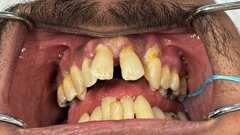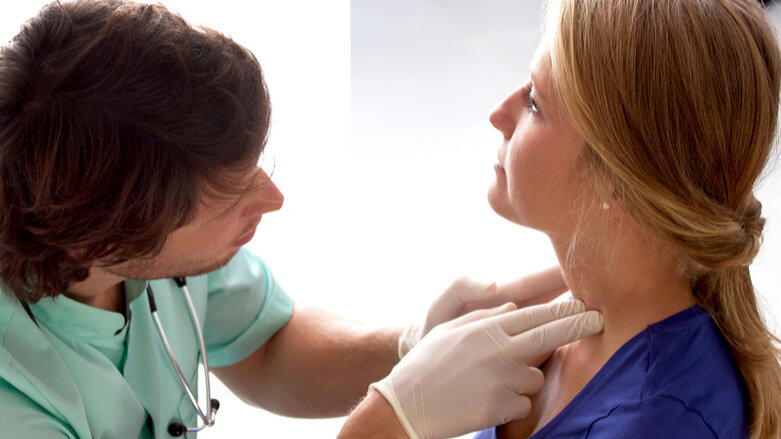AURORA, Colo., U.S.: Since oral cavity cancer is often only discovered late in its development, patients with this advanced form of disease have a 5-year survival rate of only 40 percent. Researchers from the University of Colorado Denver (CU Denver) now found that the lymph node ratio (LNR) provides an indication for the seriousness of oral cavity cancer. This knowledge could not only help patients better predict the course of their disease, but could also help doctors choose the most appropriate post-surgical treatment.
Researchers from CU Denver’s Cancer Center collected information from 149 patients treated at UCHealth University of Colorado Hospital with surgery and or post-surgical treatments for locally-advanced oral cavity cancer from 2000 to 2015, in order to look for patterns in the collected data.
“We wanted to know if features of these patients, their tumors or their treatment could predict survival,” said first author Ding Ding, a medical student at the Department of Radiation Oncology at CU Denver.
As a first step in the study, researchers confirmed a handful of the expected risk factors—based on findings of previous studies—such as being non-white, uninsured or insured by Medicaid, having a larger primary tumor, having “margins” around the tumor that tested positive for cancer even after surgery, or having tumors that had already invaded surrounding tissues, all predicted shorter overall survival rates.
Another factor that is commonly used in models predicting cancer risk is the extent of lymph node involvement. “The current nodal staging system for oral cavity cancer is based on the size, number, laterality and spread of the tumor outside the wall of the involved lymph nodes,” Ding explained. “In other types of cancers, such as breast cancer, researchers have been exploring another measure of lymph node involvement, namely whether the ratio of surgically removed lymph nodes that are positive for cancer can predict treatment outcomes. We wondered if LNR, could be a predictor of survival in oral cavity cancer, as well.”
All the study participants had a median of 29 lymph nodes removed during surgery. About 9 percent of these lymph nodes were positive for cancer. This means that some patients had an LNR above 10 per cent, while others had especially low or even zero LNR. The study found that patients with an LNR greater than 10 per cent had about two and a half times a greater risk of cancer recurrence and 2.7 times greater risk of death than patients with an LNR below 10 percent.
“In our study, LNR appeared to be more predictive of patient outcomes than the traditional method of lymph node staging. Larger scale studies are needed to verify these findings and it might be worth exploring ways to incorporate LNR into the current model for evaluating recurrence risks,” added Ding.
Patients with aggressive disease should receive more intensive chemotherapy and radiation after surgery, whereas others with less aggressive disease often forgo the full extent of these treatments. Thus, the study adds to a growing body of evidence supporting the use of LNR to identify patients at a higher risk for recurrence and death from locally-advanced oral cavity cancer.
The study, titled “Association between lymph node ratio and recurrence and survival outcomes in patients with oral cavity cancer,” was published online on Nov. 15, 2018 in JAMA Otolaryngology–Head & Neck Surgery.
Tags:
PUNE, India: According to the World Cancer Research Fund International, cancer of the oral cavity is one of the most common types of cancer worldwide, with ...
COVENTRY, UK: The impact artificial intelligence is having on the healthcare industry is becoming more and more evident on a daily basis. In dentistry, some...
LOS ANGELES, U.S.: Since current head and neck cancer staging systems include lymph node size and laterality, but focus less on the total number of positive...
ATLANTA, U.S.: The human papillomavirus (HPV) is one of the most commonly sexually transmitted infections and a known cause of cervical cancer, as well as ...
TAIPEI, Taiwan: The debate on climate change and its effects on the earth are a hot topic. One discussion, in particular, is around air pollution, which is ...
ALEXANDRIA, Va., U.S.: This year marks the centennial of the Journal of Dental Research (JDR). To celebrate, JDR is featuring a yearlong monthly ...
CHICAGO, USA: A study conducted in the U.S. has found that the human papillomavirus (HPV) vaccine may help reduce oral infections that cause mouth and ...
CHICAGO, USA: A study conducted in the U.S. has found that the human papillomavirus (HPV) vaccine may help reduce oral infections that cause mouth and ...
ANN ARBOR, Mich., U.S.: As dental implants become an increasingly common treatment modality for edentulous patients, understanding their potential side ...
RIYADH, Saudi Arabia: Oral cancer constitutes a major front in the global fight against non-communicable diseases, and heightened public awareness of risk ...
Live webinar
Mon. 23 February 2026
3:00 am EST (New York)
Ass. Prof. Elizabeth Shick, Dr. Zehra Yonel
Live webinar
Tue. 24 February 2026
1:00 pm EST (New York)
Prof. Dr. Markus B. Hürzeler
Live webinar
Tue. 24 February 2026
3:00 pm EST (New York)
Prof. Dr. Marcel A. Wainwright DDS, PhD
Live webinar
Wed. 25 February 2026
11:00 am EST (New York)
Prof. Dr. Daniel Edelhoff
Live webinar
Wed. 25 February 2026
1:00 pm EST (New York)
Live webinar
Wed. 25 February 2026
8:00 pm EST (New York)
Live webinar
Tue. 3 March 2026
11:00 am EST (New York)
Dr. Omar Lugo Cirujano Maxilofacial



 Austria / Österreich
Austria / Österreich
 Bosnia and Herzegovina / Босна и Херцеговина
Bosnia and Herzegovina / Босна и Херцеговина
 Bulgaria / България
Bulgaria / България
 Croatia / Hrvatska
Croatia / Hrvatska
 Czech Republic & Slovakia / Česká republika & Slovensko
Czech Republic & Slovakia / Česká republika & Slovensko
 France / France
France / France
 Germany / Deutschland
Germany / Deutschland
 Greece / ΕΛΛΑΔΑ
Greece / ΕΛΛΑΔΑ
 Hungary / Hungary
Hungary / Hungary
 Italy / Italia
Italy / Italia
 Netherlands / Nederland
Netherlands / Nederland
 Nordic / Nordic
Nordic / Nordic
 Poland / Polska
Poland / Polska
 Portugal / Portugal
Portugal / Portugal
 Romania & Moldova / România & Moldova
Romania & Moldova / România & Moldova
 Slovenia / Slovenija
Slovenia / Slovenija
 Serbia & Montenegro / Србија и Црна Гора
Serbia & Montenegro / Србија и Црна Гора
 Spain / España
Spain / España
 Switzerland / Schweiz
Switzerland / Schweiz
 Turkey / Türkiye
Turkey / Türkiye
 UK & Ireland / UK & Ireland
UK & Ireland / UK & Ireland
 Brazil / Brasil
Brazil / Brasil
 Canada / Canada
Canada / Canada
 Latin America / Latinoamérica
Latin America / Latinoamérica
 USA / USA
USA / USA
 China / 中国
China / 中国
 India / भारत गणराज्य
India / भारत गणराज्य
 Pakistan / Pākistān
Pakistan / Pākistān
 Vietnam / Việt Nam
Vietnam / Việt Nam
 ASEAN / ASEAN
ASEAN / ASEAN
 Israel / מְדִינַת יִשְׂרָאֵל
Israel / מְדִינַת יִשְׂרָאֵל
 Algeria, Morocco & Tunisia / الجزائر والمغرب وتونس
Algeria, Morocco & Tunisia / الجزائر والمغرب وتونس
 Middle East / Middle East
Middle East / Middle East













































To post a reply please login or register